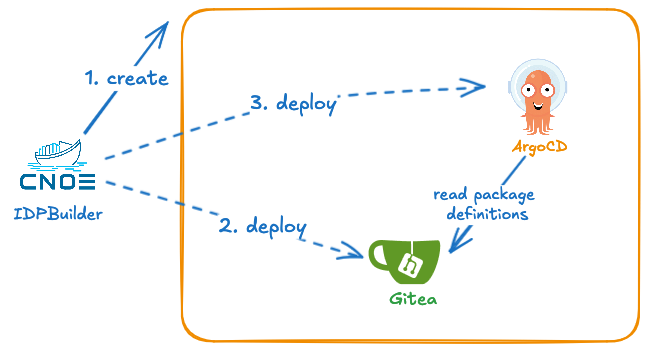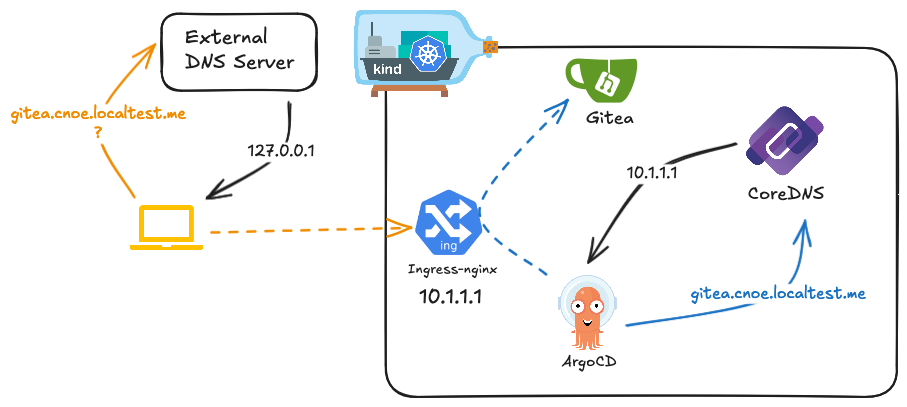How it works
Bootstrapping
When idpbuilder creates an environment for you, it performs the following tasks.
- Create a local cluster if one does not exist yet.
- Create a self-signed certificate, then set it as the default TLS certificate for ingress-nginx.
- Configure CoreDNS to ensure names are resolved correctly.
- Install Core Packages, then hands control over to ArgoCD.

Self Signed Certificate
To ensure applications inside the cluster can talk to other services, idpbuilder creates a self-signed TLS certificate. The certificate is a wild card certificate
for the domain name and any subdomains given by the --host flag.
For example, if you use the default domain name cnoe.localtest.me the certificate is issued for cnoe.localtest.me and *.cnoe.localtest.me
This certificate is then used by ingress-nginx as [the default TLS certificate](https://kubernetes.github.io/ingress-nginx/user-guide/tls/#default-ssl-certificate_. This means you can override TLS certificate used at ingress level if desired.
The certificate is also imported to ArgoCD as one of trusted CAs. This is necessary to make sure ArgoCD can talk to Gitea services without disabling TLS.
Finally, the certificate is exposed as a secret named idpbuilder-cert in the default namespace. To retrieve it, run the following command:
kubectl get secret -n default idpbuilder-cert
Networking
Overview
With the default configuration on Docker on Linux, kind cluster is set up as follows:
- A Docker container runs as the Kubernetes node and the container port 443 is exposed on host port 8443. You can confirm this by running
docker container ls - Ingress-nginx service is configured as
NodePortand listens on port 443. You can confirm withkubectl get service -n ingress-nginx ingress-nginx-controller.
With this setup, HTTP traffic for https://gitea.cnoe.localtest.me:8443 roughly looks like this.
- Domain name resolves to the local loopback address.
- A request is made to
127.0.0.1:8443with host set asgitea.cnoe.localtest.me:8443. - The request is sent to the container port 443.
- Ingress-nginx looks at SNI and the host header, then routes the traffic to the Gitea service.
- Gitea receives the request then sends back a response.
DNS
By default, idpbuilder uses the domain name cnoe.localtest.me as the base domain name to expose services such as ArgoCD and Gitea.
Most subdomains under localtest.me resolves to the local loopback address.
This allows us to have a consistent name that resolves to a known IP address without using the localhost name.
See the localtest.me documentation site for more information.

In-cluster DNS Configuration
idpbuilder configures in-cluster DNS service (CoreDNS) to ensure domain names are resolved correctly.
The name given by the --host flag resolves to the ingress-nginx controller service address.
This allows us to resolve the domain name inside and outside cluster to the same endpoint.
As described above, the default domain name, cnoe.localtest.me, resolves to a local loopback address such as 127.0.0.1.
This works for accessing the ingress-nginx service from outside the cluster because the service port is exposed as NodePort on the local machine.
This approach does not work for in-cluster traffic because the address resolves to local loopback interface.
For example, if ArgoCD pod wants to access Gitea at gitea.cnoe.localtest.me, the address resolves to 127.0.0.1 which is the local loopback address within the node.
To ensure ArgoCD can talk to Gitea services, in-cluster DNS must be configured like so:
rewrite name gitea.cnoe.localtest.me ingress-nginx-controller.ingress-nginx.svc.cluster.local
This CoreDNS rewrite rule instructs CoreDNS to resolve requests made for gitea.cnoe.localtest.me using the address given by ingress-nginx-controller.ingress-nginx.svc.cluster.local
Domain-based and Path-based routing
idpbuilder supports two modes of routing requests to in-cluster resources: domain-based and path-based.
The behavior is configured with the --use-path-routing flag, which defaults to false.
Domain-based routing
This is the default behavior of idpbuilder. In this mode, services are exposed under their own domain names. For example:
- ArgoCD UI is accessed via
https://argocd.cnoe.localtest.me - Gitea UI is accessed via
https://gitea.cnoe.localtest.me
This approach is generally cleaner and offers more flexible routing options because it requires less complex ingress configurations.
Path-based routing
When you use the --use-path-routing flag, idpbuilder configures all services under a single domain name, with routing based on path parameters.
For example:
- ArgoCD UI is accessed via
https://cnoe.localtest.me/argocd - Gitea UI is accessed via
https://cnoe.localtest.me/gitea
This is useful when you are constrained to using a single domain name and cannot use subdomains.
A good example is when using GitHub Codespaces. When forwarding ports in Codespaces, you are given a single domain name (like wild-broomstick-abc.github.dev) to reach all services running in your codespace.
In such situations, you cannot use subdomains (e.g., argocd.wild-broomstick-abc.github.dev would not work), making path-based routing the appropriate choice.
Core Packages
idpbuilder installs the following packages to the cluster.
- ArgoCD is the GitOps solution to deploy manifests to Kubernetes clusters. In this project, a package is an ArgoCD application.
- Gitea server is the in-cluster Git server that ArgoCD can be configured to sync resources from. You can sync from local file systems to this.
- Ingress-nginx is used as a method to access in-cluster resources such as ArgoCD UI and Gitea UI.
Once installed, idpbuilder passes control over these packages to ArgoCD by storing manifests in Gitea repositories then creating ArgoCD applications. From here on, ArgoCD manages them based on manifests checked into Git repositories.
Getting Relevant Secrets
The idpbuilder get secrets command retrieves the following:
- ArgoCD initial admin password.
- Gitea admin user credentials.
- Any secrets labeled with
cnoe.io/cli-secret=true.
You can think of the command as executing the following kubectl commands:
kubectl -n argocd get secret argocd-initial-admin-secret
kubectl get secrets -n gitea gitea-admin-secret
kubectl get secrets -A -l cnoe.io/cli-secret=true
If you want to retrieve secrets for a package, you can use the -p flag. To get secrets for a package named gitea:
idpbuilder get secrets -p gitea
For the -p flag to work, you must label the secret with cnoe.io/package-name.
For example, to make secret values available in a secret named my-secret for a package named foo:
kubectl label secret my-secret "cnoe.io/package-name=foo" "cnoe.io/cli-secret=true"
The secret will then be listed when issuing the idpbuilder get secrets command.
Alternatively, you can use the following command to retrieve the individual secret:
idpbuilder get secrets -p foo